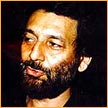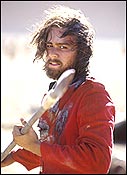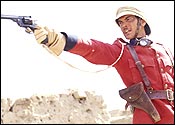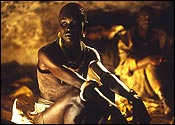
|
'We were driven to make something extraordinary'
Shekhar Kapur crafted his latest saga, The Four Feathers, out of a Bollywood-like chaos.
|
Shekhar Kapur believes every film he makes should be entertaining. But he is not shy of offering a few life lessons. His new film The Four Feathers revolves around a young man who refuses to fight Britain's war in Sudan.
Kapur offers in the movie a moral tale about colonialism and personal courage. The film is based on a novel by A E W Mason whose popularity led to half a dozen movie versions.
The young man (played by Heath Ledger) in the movie, who is branded a coward by his friends and his fiancee because of his anti-war stance, still goes behind the enemy lines in Sudan to rescue his friends when the war goes badly for the British.
Kapur's film opened at the Toronto international film festival September 8, 12 days before its release in North America. Kapur spent several days in New York and Toronto to promote the movie produced by Paramount Pictures and Miramax.
Kapur, who started his movie career in Bollywood as an actor nearly two decades ago with films like Jaan Haazir Hain, is much admired in the West for the performances he coaxes out of his stars.
The filmmaker confesses to Arthur J Pais that he wanted a Bollywood-like chaos for his Hollywood film:
In your previous movie Elizabeth, you had an uncredited part. Do we have to look around for you in the new movie, too?
No, no. I am not there onscreen in this movie (laughs). I was the man who stabs the bishop in Elizabeth. How long was the scene? You see me for a few seconds.
I think I am not interested in acting anymore. Unless, of course, someone comes up with a wonderful part.
This is your second mainstream movie outside India. What are some of the big challenges you were faced with in this film?
I have taken up a far more complicated and interesting subject in the new film. Though it is set in the late 19th century, it is also very contemporary.
In what sense?
I have seen the previous films based on Mason's novel. They celebrated colonisation. This film was completed before September 11, 2001. But the more I think of the horrendous events, the more I firmly believe that the root cause of the terror that we face today is built in the colonial history.
Would you say it is a political film?
In a way, yes. So was Elizabeth. But it was essentially about a person --- in that case a woman --- who fought many challenges and ended up triumphant.
Phoolan Devi (in Bandit Queen) also had to fight many challenges. I see The Four Feathers more of a story of a young man coming in terms of who he really is and how he faces his internal demons. Everyone in the film goes on an internal journey.
There are also other lessons to be learned from the film?
 If you do not learn from history, you do not learn at all. But let us not forget that this is also a very entertaining and dramatic film.
If you do not learn from history, you do not learn at all. But let us not forget that this is also a very entertaining and dramatic film.
You have worked with some of the finest composers, including Rahul Dev Burman (Masoom) and Nusrat Fateh Ali Khan (Bandit Queen). You have used quite a bit of Indian music in The Four Feathers.
Not Indian music. It is Sufi music, and you know it is Islamic. I wish I could have used Nusrat's voice and music. I wish he were alive. But we were lucky to have found his nephew (and chosen heir), Rahat.
How did it come about?
Composer James Horner was also of the opinion we should have some ethnic music in the film. So we went ahead. We were a bit worried about how the studios will react. Now everyone is in love with the soundtrack.
You have said you wanted Bollywood-like chaos while you made this film. How did you go around organising the 'chaos'?
It was inevitable. We were shooting in the Moroccan desert. I wanted real shots of the chaos and turbulence connected with a war. No digital shots of sandstorms or anything like that. My cinematographer Robert Richardson was game. I asked him if he could shoot from the hip, and he said that is how he had started his career.
What were some of the more pressing logistic problems?
Handling camels. They are never easy to handle, especially when a shoot is involved. We shot this film in about three months, mostly in Morocco. There was constant turmoil; sandstorms were also part of the problem. But out of the chaos and panic situations came a lot of energy. We were driven to make something extraordinary.
I feel Hollywood has forgotten to make films like this.
What is the single most thing you have got out of working in Bollywood?
 To work under the most chaotic conditions. Whenever we ran into problems, I would tell my unit that I come from India and we are used to chaos.
To work under the most chaotic conditions. Whenever we ran into problems, I would tell my unit that I come from India and we are used to chaos.
What are some of the significant changes you brought to the movie?
I thought when I read the first script, it had celebrations of colonisation. I wrote scenes of senseless killing, scenes showing the arrogance of the West. You will find them very early on in the movie.
Why did you take such a long time to start working on your next project after Elizabeth which came out in 1998?
I toyed with many projects but the scripts were not to my liking. Or some projects were delayed for a number of reasons.
How do you go around choosing your actors?
You hear about them from others, or you have seen them in interesting parts in other films. I had tested Dijmon Hounsou (who plays a mysterious guardian angel in the film) to play the younger Nelson Mandela. But that project is stalled. I had admired his work in Amistad (a film directed by Steven Spielberg).
I found in him an extraordinary actor.
There have been all kinds of rumours about the Mandela project. Is it still on? Is Morgan Freeman still attached to it (to play Mandela?)
Very much. But it is such a gigantic project, and the script has to shape to so many people's satisfaction.
Especially, yours.
Of course (smiles)
 Are you always drawn to period dramas?
Are you always drawn to period dramas?
It looks like that, isn't it? But I have also been trying to make Nine o' Clock War about a contemporary revolution and how media manipulates it.
And where is that project headed?
Script, I want a brilliant script.
You also were the executive producer of the comedy The Guru. Are you happy the way it has shaped up?
People love it. Many critics in England did not like it. But critics did not like Bombay Dreams (whose story idea came from Kapur). Yet, it is a big hit.
What is an important quality you look for in your films?
How persons grow, how they go undergo internal changes. It was true with Masoom and everything I have taken up since then.
What is next?
This film is not yet over (smiles). There is a lot more promotion to be done. I have been with this film for about two-and-half years. I need some rest, too (laughs).
Also read:
The buzz about The Four Feathers
|